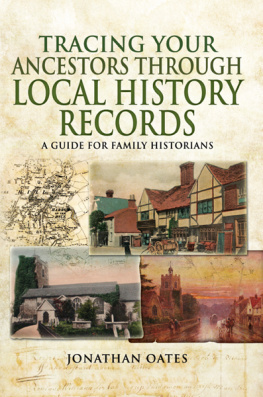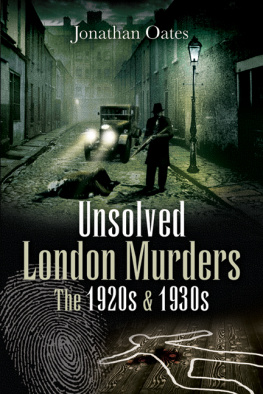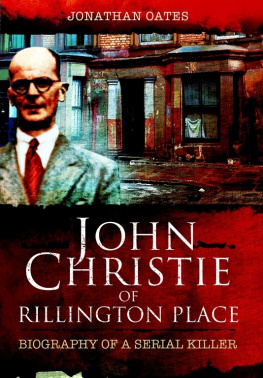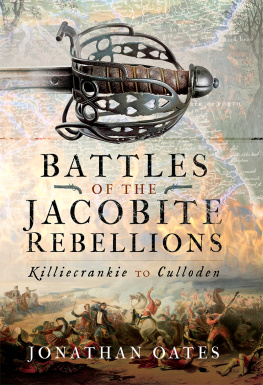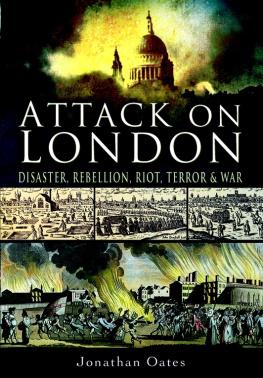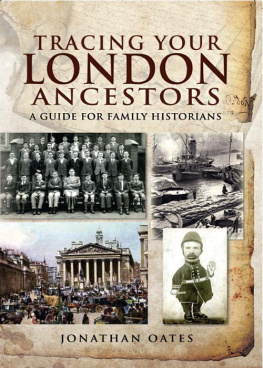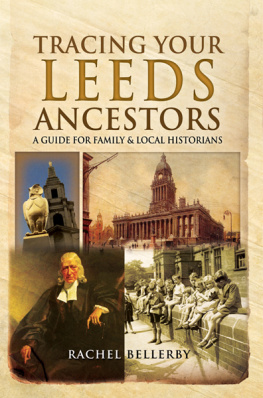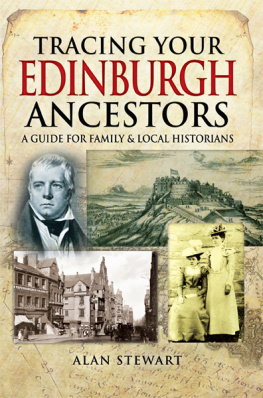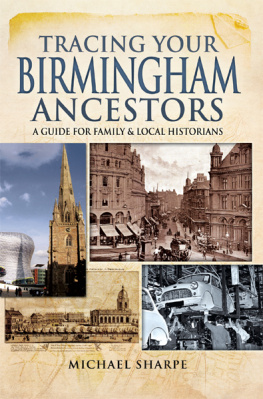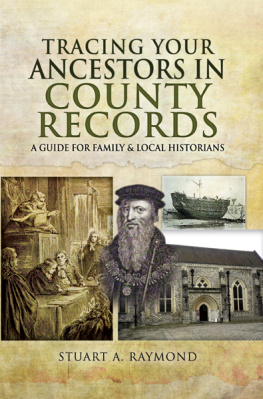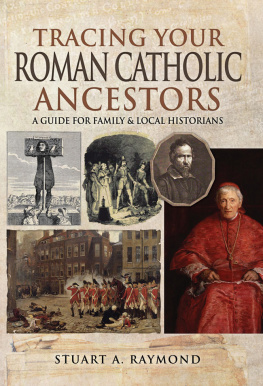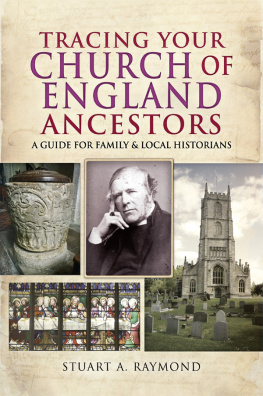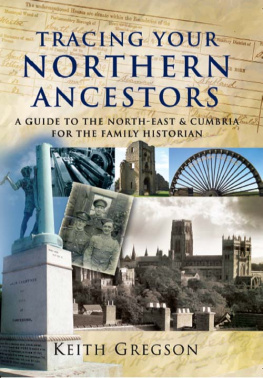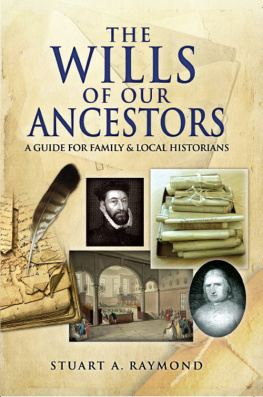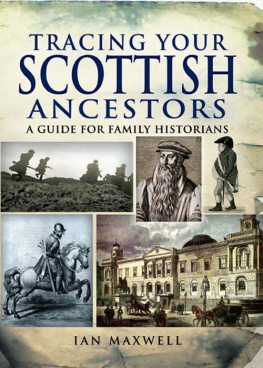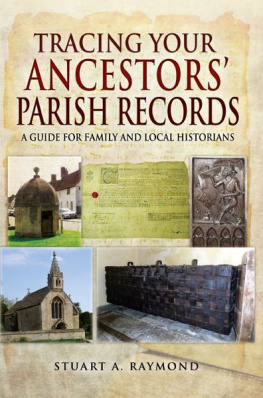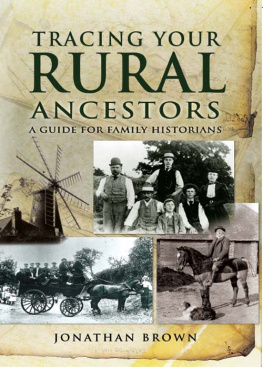FAMILY HISTORY FROM PEN & SWORD
Tracing Your Army Ancestors
Simon Fowler
Tracing Your Pauper Ancestors
Robert Burlison
Tracing Your Yorkshire Ancestors
Rachel Bellerby
Tracing Your Air Force Ancestors
Phil Tomaselli
Tracing Your Northern Ancestors
Keith Gregson
Tracing Your Black Country Ancestors
Michael Pearson
Tracing Your Textile Ancestors
Vivien Teasdale
Tracing Your Railway Ancestors
Di Drummond
Tracing Secret Service Ancestors
Phil Tomaselli
Tracing Your Police Ancestors
Stephen Wade
Tracing Your Royal Marine Ancestors
Richard Brooks and Matthew Little
Tracing Your Jewish Ancestors
Rosemary Wenzerul
Tracing Your East Anglian Ancestors
Gill Blanchard
Tracing Your Ancestors
Simon Fowler
Tracing Your Liverpool Ancestors
Mike Royden
Tracing Your Scottish Ancestors
Ian Maxwell
Tracing British Battalions on the Somme
Ray Westlake
Tracing Your Criminal Ancestors
Stephen Wade
Tracing Your Labour Movement Ancestors
Mark Crail
Tracing Your London Ancestors
Jonathan Oates
Tracing Your Shipbuilding Ancestors
Anthony Burton
Tracing Your Northern Irish Ancestors
Ian Maxwell
Tracing Your Service Women Ancestors
Mary Ingham
Tracing Your East End Ancestors
Jane Cox
Tracing the Rifle Volunteers
Ray Westlake
Tracing Your Legal Ancestors
Stephen Wade
Tracing Your Canal Ancestors
Sue Wilkes
Tracing Your Rural Ancestors
Jonathan Brown
Tracing Your House History
Gill Blanchard
Tracing Your Tank Ancestors
Janice Tait and David Fletcher
Tracing Your Family History on the Internet
Chris Paton
Tracing Your Medical Ancestors
Michelle Higgs
Tracing Your Second World War Ancestors
Phil Tomaselli
Tracing Your Channel Islands Ancestors
Marie-Louise Backhurst
Tracing Great War Ancestors DVD
Pen & Sword Digital & Battlefield History TV Ltd
Tracing Your Prisoner of War
Ancestors: The First World War
Sarah Paterson
Tracing Your British Indian Ancestors
Emma Jolly
Tracing Your Naval Ancestors
Simon Fowler
Tracing Your Huguenot Ancestors
Kathy Chater
Tracing Your Servant Ancestors
Michelle Higgs
Tracing Your Ancestors from 1066 to 1837
Jonathan Oates
Tracing Your Merchant Navy Ancestors
Simon Wills
Tracing Your Lancashire Ancestors
Sue Wilkes
Tracing Your Ancestors through Death Records
Celia Heritage
Tracing Your West Country Ancestors
Kirsty Gray
Tracing Your First World War Ancestors
Simon Fowler
Tracing Your Army Ancestors 2nd Edition
Simon Fowler
Tracing Your Irish Family History on the Internet
Chris Paton
Tracing Your Aristocratic Ancestors
Anthony Adolph
Tracing Your Ancestors from 1066 to 1837
Jonathan Oates
First published in Great Britain in 2016
PEN & SWORD FAMILY HISTORY
an imprint of
Pen & Sword Books Ltd
47 Church Street,
Barnsley
South Yorkshire,
S70 2AS
Copyright Jonathan Oates, 2016
ISBN: 978 1 47383 802 4
PDF ISBN: 978 1 47388 059 7
EPUB ISBN: 978 1 47388 058 0
PRC ISBN: 978 1 47388 057 3
The right of Jonathan Oates to be identified as Author of the Work has been asserted by him in accordance with the Copyright, Designs and Patents Act 1988.
A CIP catalogue record for this book is
available from the British Library.
All rights reserved. No part of this book may be reproduced or transmitted in any form or by any means, electronic or mechanical including photocopying, recording or by any information storage and retrieval system, without permission from the Publisher in writing.
Typeset in Palatino and Optima by CHIC GRAPHICS
Printed and bound in England by
CPI Group (UK), Croydon, CR0 4YY
Pen & Sword Books Ltd incorporates the imprints of Pen & Sword Archaeology, Atlas, Aviation, Battleground, Discovery, Family History, History, Maritime, Military, Naval, Politics, Railways, Select, Social History, Transport, True Crime, Claymore Press, Frontline Books, Leo Cooper, Praetorian Press, Remember When, Seaforth Publishing and Wharncliffe.
For a complete list of Pen & Sword titles please contact
PEN & SWORD BOOKS LTD
47 Church Street, Barnsley, South Yorkshire, S70 2AS, England
E-mail:
Website: www.pen-and-sword.co.uk
CONTENTS
ACKNOWLEDGEMENTS
I would like to thank fellow archivist Ruth Costello for having read through the draft and having made many helpful suggestions. Paul Lang, who has read the text, has also, as always, been kind in assisting with pictures from his vast collection. Vanda Foster read over and provided guidance and assistance there. Any errors, are, of course, my own responsibility.
This book is dedicated to Ruth.
LIST OF ILLUSTRATIONS
INTRODUCTION
This is not a book for the beginner in family history, someone whose enthusiasm has been kindled, perhaps by Who Do You Think You Are? Rather, it is envisaged that the reader will be someone who has already constructed a family tree, perhaps going back centuries, and has names, places and dates at their command, a task that often takes years. For many, though, these ancestors are just names, potentially mere two-dimensional figures at best. This book, therefore, is for those who want to know more about their ancestors lives and times in order to flesh them out more fully. It does so by exploring the topic of local history. Local and family history are often seen as two different disciplines. But it was not always so and need not be the case now.
The roots of the study of both local history and family history stretch back several centuries. By local history what is meant is the study of a localitys past; whether it be of a county, city, town or parish (or even a whole region, for example, the northwest of England), as opposed to national or international history, which is the mainstay of the educational curriculum or history in the media. Within that remit, such a history may be very specific, such as a history of a particular topic, for instance, the impact of a world war on a community, a local industry or political movement, or may be more ambitious, an attempt to cover centuries of a towns history. It may be the work of amateur historians or those who are professionals. Unlike family history, research often results in publication, either by a publishing house or self-published. It may be mainly made up of illustrations or may be primarily text-based. Local histories exist in prodigious numbers and there can be few places in Britain which have not been covered by a local history book and a Wikipedia website, of varying quality and age.
The materials for these histories, are, as with those for family history, numerous and varied and not to be found in one place. Many are, of course, located in the county or borough record office or in the reference section of county and city libraries. Others are held at the National Archives or specialist repositories. Finally, there is also value in viewing the place itself, though remembering that much will have altered throughout the ages, depending on the locality.
By now the reader may well be asking what local history has to do with family history. After all, the local and the family historian are looking for different subject matter; the former for the history of a place and its inhabitants, the latter for a particular individual or family. At one time, record office staff would categorise the two types of researcher as being wholly different (perhaps some still do).
Next page
